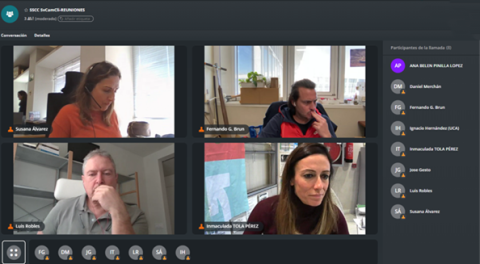Discussions on Carbon Removals and Carbon Farming (CRCF)
The European Union recently published the regulation with the aim of establishing a Union certification framework for permanent carbon removals, carbon farming and carbon storage in products, which is expected to be fully operational by 2028. This certification framework will boost innovative carbon removal technologies and carbon farming as well as a certification scheme to ensure that they are transparent and trusted. According to this new regulation, the current carbon offsetting projects using nature based solutions, which are the main focus of the NACAO project, could be affected and transformed by matters such as recognition of certification schemes.
The fifth Andalusian stakeholder meeting was held in February to analyse this issue. The Andalusian Climate Change Office (OACC) organised this meeting with the Verico SCE, the University of Cádiz and the Public Agency for Environment and Water (AMAYA) in order to discuss how offsetting projects are expected to be affected by the first EU-wide voluntary framework. These are important stakeholders in the NACAO project due to their specific knowledge in different matters such as certification schemes, voluntary carbon markets or carbon farming methodologies in nature-based solutions.
The meeting was initiated introducing the discussion on how offsetting projects could be affected by the new CRCF regulation. The attendants shared an overview regarding the main features of the new EU regulation. Key concepts such as groups of operators, certification systems, certification entities, additionality and Union registry were discussed. All participants agreed that a period of uncertainty is now beginning and different public systems and methodologies will coexist for a period of time. At the moment, many important questions remain unanswered by this new voluntary framework, such as, how the new methodologies developed by the EU will take into consideration those that already exist, and, if there will be a unified European registry or registries operated by different public administrations that currently exist will continue to operate.

The first new methodologies in which the expert group is working on are supposed to be available in September 2025. Moreover, as part of its prioritisation the European Commission shall take into account whether the activities contribute to the sustainable management of agricultural land, forests and the marine environment.
The OACC and the expert members of Verico SCE are considering the possibility of sharing this information with the rest of the partner regions. It may be of interest to record an interview with one of the experts, including key concepts and information on the topic.
Finally, the OACC presented some news about the NACAO project to the meeting participants: the recently celebrated mid-term review, in which Interreg Europe officials confirmed that the partnership between the regions stays strong, with all partners ready to apply their own policy improvements and the thematic of the next Interregional Thematic Seminar in Poland related to “Engaging Organizations and Citizens in nature-based Emissions Offsetting”.

